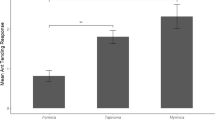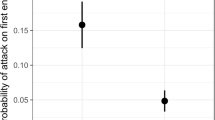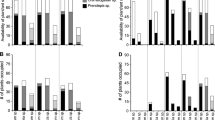Abstract.
We examined the relationship between maternal care and ant-tending in the treehopper species, Publilia modesta. Ant-tending increased the number of nymphs surviving to adulthood by approximately fivefold. Maternal care increased the number of nymphs surviving to adulthood by approximately 50% in the presence of ants. Maternal care had either no effect or the opposite effect in the absence of ants; when ants were not present survivorship was 30% lower in the presence of mothers. Maternal care increased the average number of ants tending nymph aggregations approximately threefold early in the summer; consequently, we suggest that the primary benefit of maternal care is to attract ants while nymphs are small and few in number. Because there was no benefit of maternal care in the absence of ants, we conclude that ant-tending provides an ecological context that favors maternal care in this treehopper species.
Similar content being viewed by others
Author information
Authors and Affiliations
Additional information
Electronic Publication
Rights and permissions
About this article
Cite this article
Billick, I., Weidmann, M. & Reithel, J. The relationship between ant-tending and maternal care in the treehopper Publilia modesta . Behav Ecol Sociobiol 51, 41–46 (2001). https://doi.org/10.1007/s002650100405
Received:
Revised:
Accepted:
Issue Date:
DOI: https://doi.org/10.1007/s002650100405




